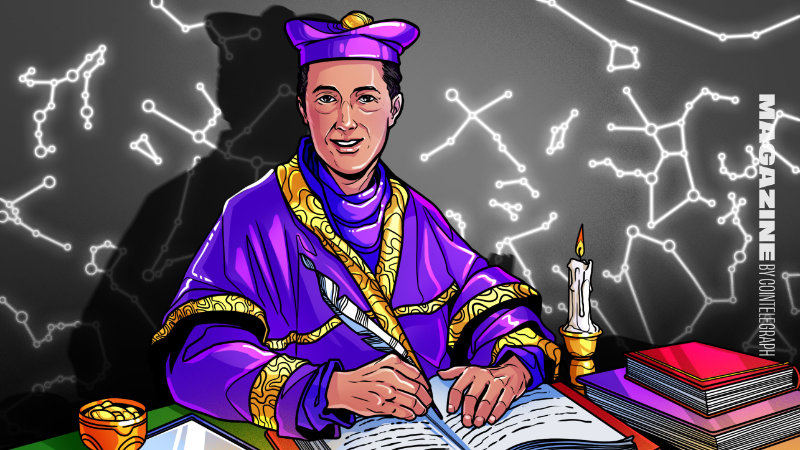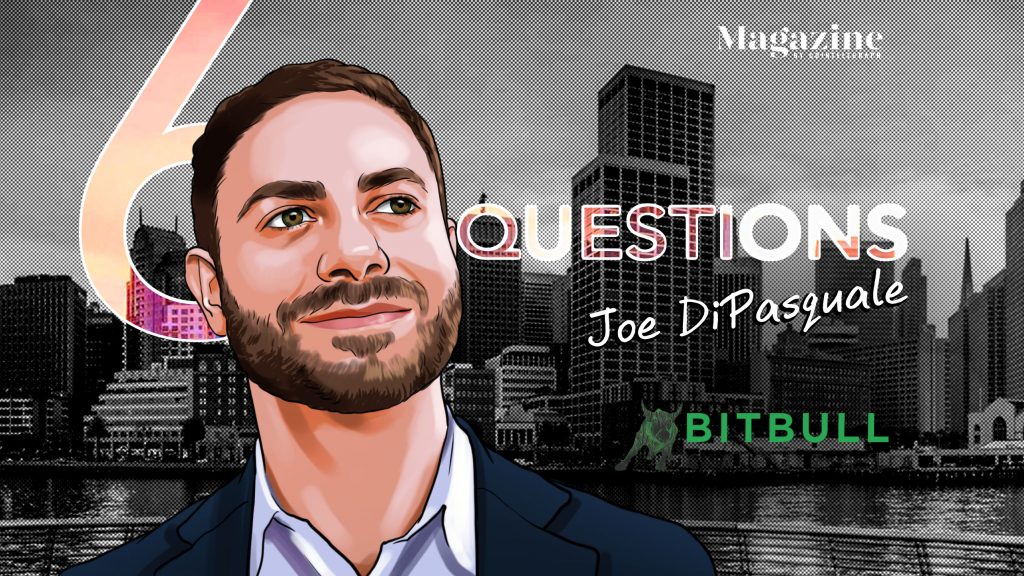While many crypto traders are busying themselves with wacky Fibonnaci charts and Bollinger Bands, there’s a growing cohort of traders who say prices can be predicted by crypto astrology.
“Psychic services,” which include astrology and other divinations, have become a $2.2-billion business in the US alone, and some forecasts estimate astrology could be a $22.8-billion industry by 2031.
Meanwhile, a recent Pew Research Center Study that surveyed 9,593 Americans found that in 2024, about 28% of people said they consulted astrology at least once a year. Social media is also chock-full of stock and crypto traders who claim to use their “high self” to win in the stock market.
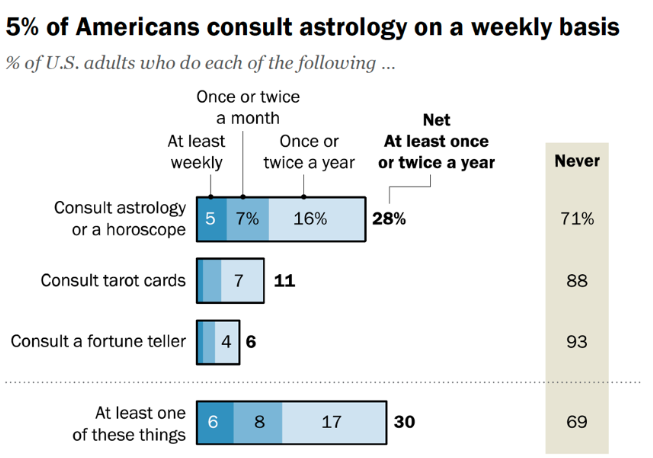
That being said, astrology has its critics.
Professional crypto day trader Craig Cobb, a technical analyst, tells Magazine he would never in a million years consider using astrology to make a trade.
“For me, I would never do it. I would never, ever, EVER trade based on astrology or the moon phase,” Cobb tells Magazine, adding he’d much rather go fishing on the moon.
“Since markets were around, everyone’s been trying to find a way to profit from them, whether they use astrology or technical analysis or fundamental analysis,” says Cobb, whose career depends on using technical analysis to make his calls.
But others swear it works. Could astrology and other “divinations” really predict crypto prices — or at least provide a framework to help make trading calls?
Crypto astrologists certainly think so
The moon’s gravitational pull does actually influence the ocean’s tides, and astrology takes this idea a step further and posits that the movement of celestial bodies such as planets, moons and stars generates energetic shifts that impact human behavior.
And since the stock and crypto markets are made up of billions of individual people with particular wants, emotions and desires, the theory is that financial astrology can be used to predict market movements.
Crypto Damus is one of the most high-profile crypto astrologists in the game with 50,000 followers on X. He tells Magazine he predicted all three major Bitcoin tops in 2024, along with the extended summer sell-off, simply by looking at the planets.
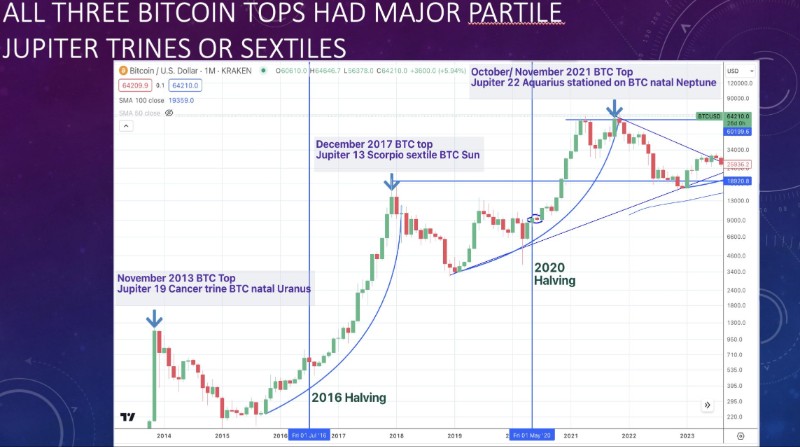
More recently, he says he tipped the Bitcoin sell-off in the first four months of 2025 by tracking “transiting Saturn conjunctions in the Bitcoin natal chart” among other signs.
“Saturn is a kind of heavy, serious fear planet,” explains Damus. “It’s a bear market signal in financial astrology.”
Conversely, Jupiter is the biggest and brightest star and represents abundance and prosperity and could signal cycle tops, he says.
“It definitely works if you know how to use it.”
Skeptics and rationalists will be shaking their heads at this, but there is some evidence of at least tenuous links between what’s going on above our heads and markets.
A 2006 study from academics at the University of Michigan found that stock returns are lower on the days around a full moon by 3%-5% per annum across 48 countries.
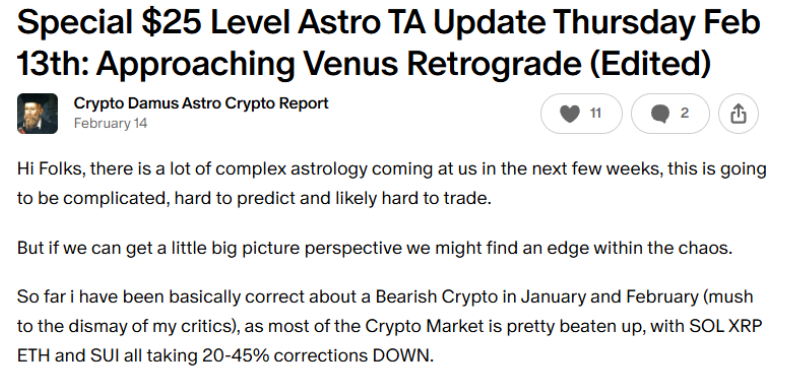
The researchers also noted the lunar effect wasn’t explained away by macroeconomic factors or global shocks and was independent of other calendar-related events like days of the week or national holidays.
However, the researchers also noted that the study came from them starting from the conclusion and then trying to find data to back it up, so the correlation could be “simply due to chance.”
Another study in 2013 from two academics at the University of Portsmouth also found some data that suggests moon phases impact the stock market.
Damus says the moon phases are just the tip of the astrology iceberg.
“People say, ‘Well, the moon moves tides and the oceans, right?’ But does Pluto move the tides in the ocean? That’s a much harder argument to make.”
“So, I don’t think it’s really gravity. I don’t think it’s anything that could be measured scientifically; it’s some kind of like, quantum physics level, spooky action at a distance.”
Using astrology to predict crypto prices
So, let’s assume for the sake of argument there is something to it. What is the actual process used for predicting crypto prices using astrology?
One way to do it is to assign a “natal chart” to a specific cryptocurrency or security.
A natal chart maps all the planets and stars in the sky at the exact time and place of birth.
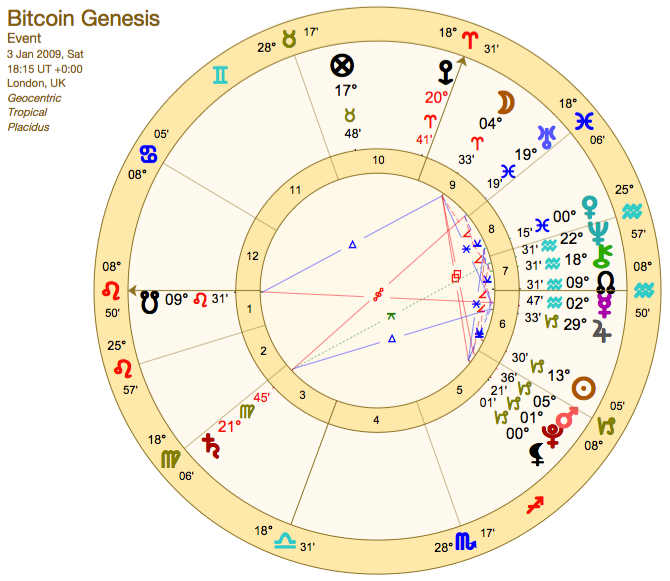
“They might look at the date the particular stock went on the market and use that as a natal chart. And then they would actually take that natal chart and look at what’s in the sky or what’s coming because the planets are always moving,” explains Psychic Ralph, Canadian psychic life coach.
For a crypto astrologist, they could base the natal chart on a cryptocurrency’s timestamped genesis block (Jan. 3, 2009, for Bitcoin).
Astrologists then take this natal chart and look into its future using an ephemeris, a table or data set that can calculate the position of celestial objects at any point in time — since planets and stars follow a trajectory that can be calculated with decent accuracy, Ralph explains.
When this is then overlaid with historical market data, financial astrologists believe they are able to determine planetary aspects or positions that coincide with real-world market movements, informing them whether Bitcoin is about to enter a boom period or bust… in theory.
Or maybe crypto astrology is a load of bull
Skeptics argue that there’s no empirical evidence to show that using astrology to predict prices works any better than pure chance. There’s a long history of people using outside-the-box methods to predict the market, including tarot cards and artificial intelligence bots. Remember the crypto-trading hamster?
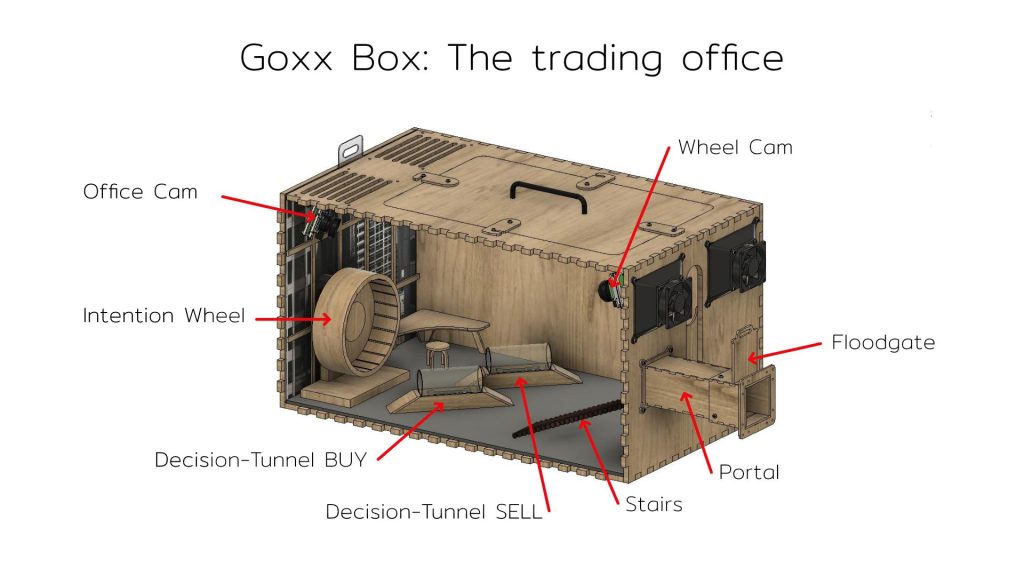
Mr. Goxx, a German hamster, shot to world fame after outpacing the S&P 500 and Warren Buffett during crypto’s meteoric bull run in 2021.
The hamster would “pick” cryptocurrencies using his running wheel, which would cycle through a list of pre-selected cryptocurrencies. Once the hamster ran through one of two tunnels labeled as either “buy” or “sell,” sensors in the cage would pick this up and automatically place the selected order.

It certainly seemed to rely on chance, but Mr. Goxx did amazingly well with returns on his portfolio, reaching as high as 46.6% in September 2021.
Of course, you could argue that anyone could appear to be a brilliantly gifted psychic during a crypto bull market, as everything goes up in unison.
Unfortunately, Mr. Goxx died on November 24, 2021, after an illustrious five-month trading career. His replacement, Mr. Goxx 2.0, did much worse with a negative 25.57% return within a few months.
Astrology has been around for thousands of years
But proponents argue that astrology has been around for thousands of years, with some earliest evidence dating the practice back to 3,000 BC.
Crypto Damus says it may defy conventional logic, but believers are convinced it’s legit.
“There’s no real rational explanation for why astrology works.”
Damus argues that planetary alignments and their correlation to events in the real world result from “meaningful coincidences” that can’t be explained by cause and effect — referencing Swiss psychiatrist and the founder of analytical psychology Carl Jung’s concept of “synchronicity.”
“It’s not just a coincidence; it’s two things that are seemingly unconnected, but on a deeper mystical level, there’s a meaningful connection,” he explains.
But without an explainable cause and effect, many smart, sophisticated and rational people refuse to accept it, he says.
“And so they kind of dismiss it as being utter bullshit, and that’s unfortunate. First of all, I don’t think you believe in astrology or not believe in astrology. Astrology is based on observational, like empirical data, and observation of the planetary alignments and the events on Earth.”
“Whether you notice the correlations or not… astrology is happening. Astrological configurations and alignments and their correlations on Earth are definitely happening.”
“The question isn’t whether you believe in it or not. It’s not like Jesus. You don’t have to have faith in, you know, some religious teaching. It’s whether you’re open-minded enough to investigate it for yourself.”
John Pierpont Morgan, founder of investment banking giant JPMorgan, is rumored to have practiced astrology and supposedly once said, “Millionaires don’t use astrology, billionaires do.” (Some claim the quote was fabricated.)
Another rumor is that Morgan didn’t board the Titanic due to advice from an astrologer, giving him another year of life before he ended up dying in his sleep in 1913.

Simply having a strategy beats 90% of crypto traders
While technical analyst Cobb says he doesn’t see himself using astrology, he argues that even a disciplined financial astrologist will likely do better than 90% of traders today.
“Not because I have any personal views on astrology working or not working,” explains Cobb.
“What I do know is that having a form of discipline to apply to a market is going to put you in a much better position than somebody who is just chasing the latest [influencer].”
This recalls “Hitchhiker’s Guide to the Galaxy” author Douglas Adams’ argument that astrology is just a useful framework for thinking about things and could just as easily be about “ducks and drakes” as the movement of planets and stars.
“It’s just a way of thinking about a problem, which lets the shape of that problem begin to emerge. The more rules, the tinier the rules, the more arbitrary they are, the better. It’s like throwing a handful of fine graphite dust on a piece of paper to see where the hidden indentations are …. The graphite’s not important. It’s just the means of revealing the indentations.”
Cobb explains that in the markets, there are only two choices: buy or sell.
“So, how do you decide whether you’re buying or selling? Well, technical analysis is an option, tarot cards are another one, and astrology is another. There’s a bazillion ways we can skin this cat.”
“So, managing your risk is the only way you can really set yourself up to not get absolutely decimated by these little events that occur on a weekly basis.”
Don’t bank it all on astrology
Meanwhile, Crypto Damus notes that astrology shouldn’t be a be-all and end-all strategy.
“One of the things I want to just clarify, though, is that we don’t use only astrology. We just use astrology as another technical signal. I mean, we use regular technical analysis.”
“We also look at Fed policies — is the Fed raising rates, is the Fed cutting rates? That might just be more important than astrology,” he explains.
He says astrology just gives him more context into what is going on in the world, kind of like his “secret sauce.”
“When technical signal systems and astrology line up, bullish or bearish, it gives you more confidence in taking a bigger trade with more risk,” he concludes.


Felix Ng
Ether could ‘rip like 2021’ as SOL traders brace for 10% drop: Trade Secrets
If ETH can break above $4,200, it will “rip like 2021” says one analyst, but options data indicates a 10% drop for SOL. Trade Secrets.
Read more6 Questions for Joe DiPasquale of BitBull Capital
“With the blockchain, we are seeing its use in cryptocurrencies, DeFi, NFTs and the Metaverse, and even traditional finance; but most developments are still to come.”
Read moreBrandt says Bitcoin yet to bottom, Polymarket sees hope: Trade Secrets
